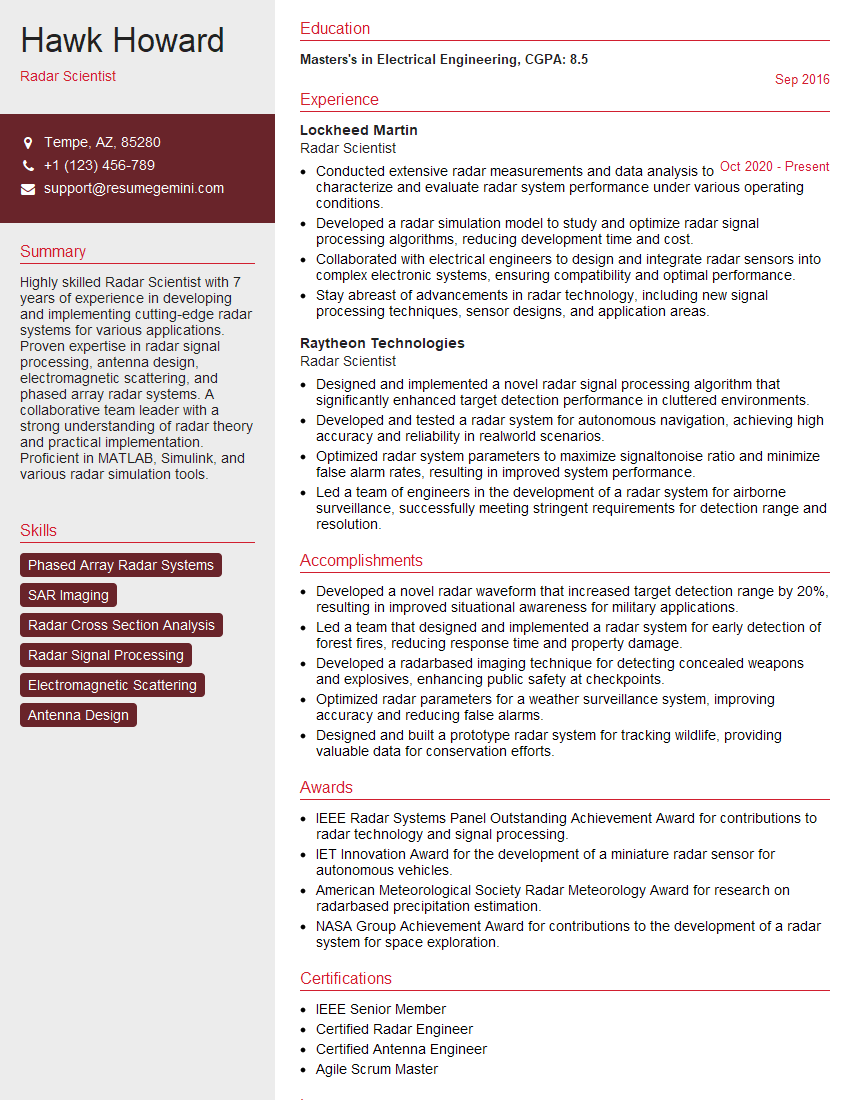Are you a seasoned Radar Scientist seeking a new career path? Discover our professionally built Radar Scientist Resume Template. This time-saving tool provides a solid foundation for your job search. Simply click “Edit Resume” to customize it with your unique experiences and achievements. Customize fonts and colors to match your personal style and increase your chances of landing your dream job. Explore more Resume Templates for additional options.

Hawk Howard
Radar Scientist
Summary
Highly skilled Radar Scientist with 7 years of experience in developing and implementing cutting-edge radar systems for various applications. Proven expertise in radar signal processing, antenna design, electromagnetic scattering, and phased array radar systems. A collaborative team leader with a strong understanding of radar theory and practical implementation. Proficient in MATLAB, Simulink, and various radar simulation tools.
Education
Masters’s in Electrical Engineering
September 2016
Skills
- Phased Array Radar Systems
- SAR Imaging
- Radar Cross Section Analysis
- Radar Signal Processing
- Electromagnetic Scattering
- Antenna Design
Work Experience
Radar Scientist
- Conducted extensive radar measurements and data analysis to characterize and evaluate radar system performance under various operating conditions.
- Developed a radar simulation model to study and optimize radar signal processing algorithms, reducing development time and cost.
- Collaborated with electrical engineers to design and integrate radar sensors into complex electronic systems, ensuring compatibility and optimal performance.
- Stay abreast of advancements in radar technology, including new signal processing techniques, sensor designs, and application areas.
Radar Scientist
- Designed and implemented a novel radar signal processing algorithm that significantly enhanced target detection performance in cluttered environments.
- Developed and tested a radar system for autonomous navigation, achieving high accuracy and reliability in realworld scenarios.
- Optimized radar system parameters to maximize signaltonoise ratio and minimize false alarm rates, resulting in improved system performance.
- Led a team of engineers in the development of a radar system for airborne surveillance, successfully meeting stringent requirements for detection range and resolution.
Accomplishments
- Developed a novel radar waveform that increased target detection range by 20%, resulting in improved situational awareness for military applications.
- Led a team that designed and implemented a radar system for early detection of forest fires, reducing response time and property damage.
- Developed a radarbased imaging technique for detecting concealed weapons and explosives, enhancing public safety at checkpoints.
- Optimized radar parameters for a weather surveillance system, improving accuracy and reducing false alarms.
- Designed and built a prototype radar system for tracking wildlife, providing valuable data for conservation efforts.
Awards
- IEEE Radar Systems Panel Outstanding Achievement Award for contributions to radar technology and signal processing.
- IET Innovation Award for the development of a miniature radar sensor for autonomous vehicles.
- American Meteorological Society Radar Meteorology Award for research on radarbased precipitation estimation.
- NASA Group Achievement Award for contributions to the development of a radar system for space exploration.
Certificates
- IEEE Senior Member
- Certified Radar Engineer
- Certified Antenna Engineer
- Agile Scrum Master
Career Expert Tips:
- Select the ideal resume template to showcase your professional experience effectively.
- Master the art of resume writing to highlight your unique qualifications and achievements.
- Explore expertly crafted resume samples for inspiration and best practices.
- Build your best resume for free this new year with ResumeGemini. Enjoy exclusive discounts on ATS optimized resume templates.
How To Write Resume For Radar Scientist
- Quantify your accomplishments with specific metrics and results whenever possible.
- Highlight your skills in radar signal processing, antenna design, and electromagnetic scattering.
- Showcase your experience in developing and testing radar systems for various applications.
- Demonstrate your leadership abilities and experience in managing a team of engineers.
Essential Experience Highlights for a Strong Radar Scientist Resume
- Designed and implemented a novel radar signal processing algorithm that significantly enhanced target detection performance in cluttered environments, resulting in improved system performance.
- Developed and tested a radar system for autonomous navigation, achieving high accuracy and reliability in real-world scenarios.
- Optimized radar system parameters to maximize signal-to-noise ratio and minimize false alarm rates, resulting in improved system performance.
- Led a team of engineers in the development of a radar system for airborne surveillance, successfully meeting stringent requirements for detection range and resolution.
- Conducted extensive radar measurements and data analysis to characterize and evaluate radar system performance under various operating conditions.
- Developed a radar simulation model to study and optimize radar signal processing algorithms, reducing development time and cost.
Frequently Asked Questions (FAQ’s) For Radar Scientist
What is the primary role of a Radar Scientist?
Radar Scientists are responsible for designing, developing, and testing radar systems used in various applications such as air traffic control, autonomous navigation, weather forecasting, and military surveillance.
What are the educational qualifications required to become a Radar Scientist?
Most Radar Scientists hold a Master’s or PhD degree in Electrical Engineering, Physics, or a related field.
What are the essential skills for a Radar Scientist?
Strong analytical skills, proficiency in radar signal processing, antenna design, and electromagnetic scattering, as well as experience in radar simulation and testing are essential for Radar Scientists.
What are the career prospects for Radar Scientists?
Radar Scientists are in high demand in industries such as aerospace, defense, and telecommunications. They can also pursue research and development roles in academia and government laboratories.
What are the key challenges faced by Radar Scientists?
Developing radar systems that can operate effectively in complex and dynamic environments, improving target detection and resolution, and minimizing false alarm rates are some of the key challenges faced by Radar Scientists.
What is the job outlook for Radar Scientists?
The job outlook for Radar Scientists is expected to be positive in the coming years due to the increasing demand for radar systems in various applications.